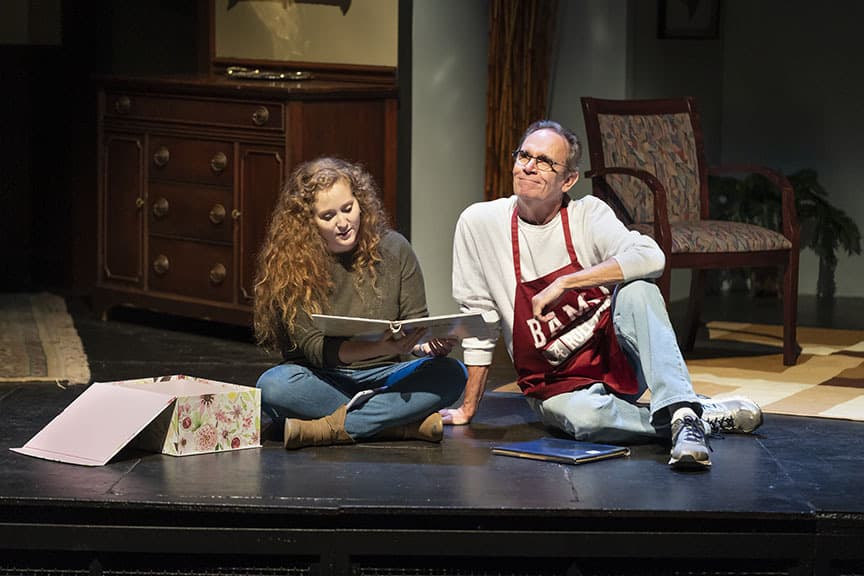Local playwright’s “Love and Cheese Toast” wins national award
From Left: Sarah Kathryn Bonds and Gary Wise in Theatre Tuscaloosa’s production of “Love & Cheese Toast” by Cooper Shattuck. Photo by Porfirio Solorzano.
July 28, 2021
Cooper Shattuck wasn’t a playwright, but he had stories to tell. Shattuck said his mother, Judy Shattuck, was also a storyteller, but she used old photo albums to tell them. A photo from her wedding album sparked a story that inspired “Love and Cheese Toast,” a play that discusses racism, discrimination and guilt in 1950s Alabama.
After over 30 years as a Tuscaloosa lawyer, he turned his family story into a play with the help of the director Tina Turley at Theatre Tuscaloosa. It was showcased at the American Association of Community Theatre’s virtual AACTFest 2021.
Following its showcase at AACTFest, Theatre Tuscaloosa performed “Love and Cheese Toast” as its first in-person production since the beginning of the COVID-19 pandemic. It ran once on July 9 and twice on July 10.
The play opens in present-day Alabama with a young woman, Mary, and her father, Charlie, sitting on a darkened stage. They discuss her plans to get married while they look at old photographs together. Charlie reminisces about his mother Judy, who is based on Shattuck’s mother, and tells the story of her wedding day.
Judy was excited to get married, but her parents wouldn’t allow her to invite the family’s Black housekeeper, Annie Mae, to the wedding. She was persistent, and the family devised a plan for Annie Mae to attend the wedding without causing an uproar.
NorQuina “Q” Rieves, the actress who played Annie Mae, said the play showed how some white families treated their housekeepers while also addressing existing racism.
“It tackles [race] in a very human way. It tackles it in a very caring and loving way. It shows inclusivity, but it also shows the lines of injustice that were still present, even at that time,” Rieves said.
Rieves said she felt connected to the role because her grandmother was a caretaker for a white family, and her mother was a playmate to the family’s white children.
“It’s kind of woven into the fabric of who I am as a person, so I wasn’t uncomfortable because I understand my history. I understand where I’ve come from, which is important to understand where I’m planning to go as an African American woman,” she said.
Shattuck said it’s important to talk about the past relationships between white people and their Black housekeepers because it isn’t often discussed. Judy loved Annie Mae, but Shattuck said the relationship was complex.
“Does it mean that Annie Mae was treated as she should have been treated because of her race? No,” Shattuck said.
After the wedding, the play jumps to Judy and Annie Mae in the past. Judy gets married, her father is killed, and her mother passes away. Judy and her husband move around the country with their two children, eventually settling down in New England.
Judy and Annie Mae reunite after 25 years when Judy is on a trip to New York. Their reunion ends with Judy crying about how Annie Mae was treated. Shattuck was inspired to write the scene by a real photo of his mother crying in Annie Mae’s lap.
“There’s a picture again that exists in my mom’s photographs of her and Annie Mae in this apartment in New York that my father took. He talked about how she was sitting in Annie Mae’s lap just bawling. And of course, nobody ever explained what she was crying about, so we don’t know what they talked about. She never did really say,” Shattuck said. “So that was a bit of editorial license, but it helped communicate the fact that at some point along the way, my mother’s attitude changed.”
When Judy apologizes to Annie Mae for the discrimination she faced, Annie Mae reassures Judy that it wasn’t her fault. Shattuck said this scene reflects the burden Black people experience.
“We should still feel bad for the way they were treated and the way they felt for generations,” Shattuck said. “It ain’t about us feeling bad about it. And so that’s why in that scene, Judy is the one crying and upset and emotional, and it falls back on Annie Mae to pat her back and make her feel better, which is again a subservient role which she’s had for her whole life.”
Rieves said the scene achieved its purpose. African Americans, she said, are tasked with explaining why racism is wrong to white people.
“We are still explaining why racism is offensive to white people who still don’t quite get it, and I don’t think it’s a matter of not quite getting it … they don’t want to get it because it causes them to acknowledge a very painful legacy that may be in their lineage that they don’t want to believe happened or they don’t want to take accountability for,” Rieves said.
Then, the play transitions to Mary and Charlie waiting for her fiance Mike to arrive for dinner. Mike is Black, and Shattuck said he ended the play with this scene because it showed that “change can happen, and it’s gradual,” but said he realizes there is more progress to be made.
“Yes, it’s good that you don’t consciously discriminate against somebody, but you have to appreciate that there are systems in place that discriminate,” Shattuck said.
Rieves said she hopes everyone who saw the play left with a feeling that there’s still work to be done.
“I think anyone that saw that play and they left the same way they came in, they were just simply entertained. If someone came in and their hearts were changed to say there’s more that I can do, then yes, the mission of that work definitely was accomplished,” Rieves said.








